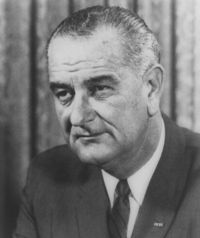Lyndon B. Johnson
| Lyndon B. Johnson | |
|---|---|

| |
| 36th President of the United States | |
| Term of office November 22, 1963 - January 20, 1969 | |
| Political party | Democratic |
| Vice Presidents | None (1963-1965) Hubert Humphrey (1965-1969) |
| Preceded by | John F. Kennedy |
| Succeeded by | Richard Nixon |
| 36th Vice-President of the United States | |
| Term of office January 20, 1961 - November 22, 1963 | |
| President | John F. Kennedy |
| Preceded by | Richard Nixon |
| Succeeded by | Hubert Humphrey |
| Born | August 27, 1908 Stonewall, Texas |
| Died | January 22, 1973 Stonewall, Texas |
| Spouse | Lady Bird Johnson |
| Religion | Disciple of Christ |
Lyndon B. Johnson assumed the office of President after the assassination of John F. Kennedy. He held that position from 1963 until 1969. Though he won election handily in 1964, he decided not to seek re-election in 1968 due to the unpopularity of the Vietnam War.
Johnson was born in Stonewall, Texas, as one of five children. He graduated from Johnson City High School in 1924, and in 1926 enrolled in Southwest Texas State Teachers' College, graduating in 1931.
In 1932 Johnson moved to Washington, D.C. to work as an aide to Congressman Richard Kleberg. He briefly attended law school at Georgetown. In 1934 Johnson married Claudia Taylor (known as "Lady Bird"), with whom he had two daughters, Lynda (b. 1944) and Luci (b. 1947). In 1935, Johnson returned to Texas to run the Texas National Youth Administration, which created jobs for young people during the Depression. Including his wife's nickname, Lady Bird, all members of the family had the initials LBJ.
Johnson resigned from his job in 1937 to run successfully for a seat in the House of Representatives representing Austin and the surrounding area. In 1941 he lost a controversial race for a U.S. Senate seat to the governor of Texas, Pappy O'Daniel. The race was marked by allegations of voter fraud against both candidates. Johnson retained his House seat after the election.
In 1948, Johnson ran in another controversial Senate race, this time against former governor Coke Stevenson. After no candidate won a majority of the votes in the election, Johnson defeated Stevenson in a run-off election. After joining the Senate, Johnson established relationships with several senior senators, including Richard Russell. Johnson was appointed to the powerful Armed Services Committee in 1950, which brought him into the public spotlight. He became the leader of the Democratic Party in the Senate in 1953. Johnson sought the Democratic nomination for president prior to the 1960 election, but accepted the nomination for vice-president following Kennedy's nomination.
As President, Johnson greatly expanded the federal government with his Great Society programs. He also helped the civil rights movement win legislative victories and greatly expanded the American role in Vietnam.
| |||||
| |||||